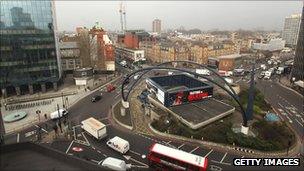Start-up Britain - Cambridge v Tech City
- Published
- comments
Entrepreneurs explain the allure of Cambridge for tech
Where in the UK do you go to find all the smartest new technology firms? East London, or Tech City as it's been dubbed, has been grabbing all the attention recently, and it's true that dozens of new media and web design businesses seem to be blossoming around the Old Street roundabout. But if you're looking for real technology firms you probably need to head 50 miles North East of London to a university town in the Fens.
That's what I did for the launch of a book called The Cambridge Phenomenon. It's a study of the emergence in Cambridge over the last 50 years of a clutch of world class technology firms, many of them born out of a university whose scientists have been behind everything from discovering the structure of DNA to building the world's first webcam.
At a launch party in the dignified but distinctly low tech surroundings of the Senate House, the Cambridge great and good had all turned up. I spotted Herman Hauser, founder of Acorn and now godfather to many start-ups, Sir Alec Broers, the scientist who after a business career which included many years at IBM, returned to the university as a vice-chancellor determined to forge stronger links with the outside world, and Warren East, the chief executive of ARM, the chip designer which is Cambridge's biggest success story so far.
The speakers described a culture which encouraged students and academics to look outwards, and a community which supported young companies with a spirit of collaboration and advice from those who had gone before. So, for instance, ARM was born out of Acorn Computer in the 1980s, but is now itself providing help and inspiration to the next generation of start-ups.
But having heard from the Cambridge veterans, I was on the lookout for evidence that the spirit of innovation really was still alive, and that clever new companies were emerging from the university. And in the nostalgic crowd, I found two young entrepreneurs, both products of the university, and both convinced that this is the place to grow their companies.

Hundreds of tech firms are based near the "Silicon Roundabout" aka Tech City in east London
Billy Boyle's start-up business Owlstone makes gas sensors on a microchip which can detect anything from explosive to disease. He and his co-founders took their research from a Cambridge engineering lab where they were working on a microchip design and turned it into a business.
"Right from day one we wanted to take what we had in the lab and out it out in the world," he told me. "One of the great things about starting a business here is the access to talent and the willingness of people who've done it before to help. When we started lots of people gave up time to help us."
By contrast, Emmanuel Carraud emerged not from a lab but from Cambridge's relatively new Judge Business School. His start-up, MagicSolver, enables smartphone users to discover the latest and best apps from the thousands now cluttering up the Apple and Android stores. It doesn't sound a very hi-tech business, but Emmanuel told me that Cambridge software expertise and the collaborative culture were among the many good reasons to base his firm here. "There's great talent, great advice from mentors, it's really international and there's a great vibe."
So, a few reasons why Cambridge, rather than London's Tech City, may offer the UK's best chance of generating world-class technology companies. What London does have is easier access to the venture capital firms which seem so reluctant to travel outside the capital. What it lacks is strong links with a world-class university, and a powerful network of people with a track record in both science and business, willing to pass on lessons to new companies.
But the main lesson from Cambridge is that you cannot build a technology cluster overnight. When I made a programme about the Cambridge phenomenon in the early 1990s, a number of people told me that the place still needed a few billion dollar companies to act as an inspiration for others.
Now, at the latest count, it's got nine such businesses. Twenty years from now, perhaps Tech City will be home to a similar collection of world-beaters, but first it may need to attract more scientists and fewer web designers.